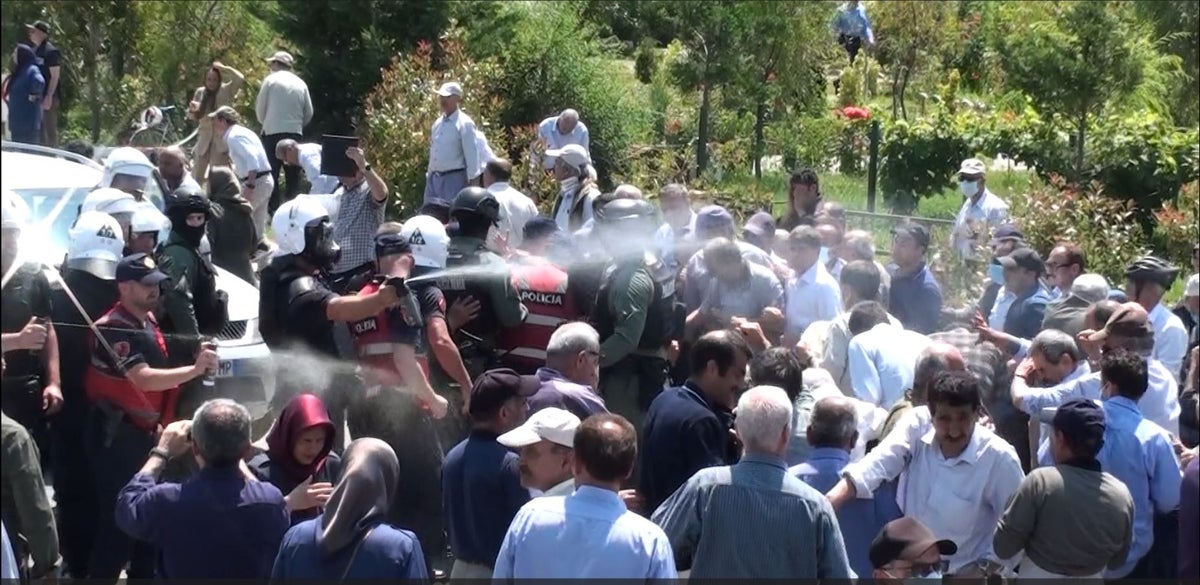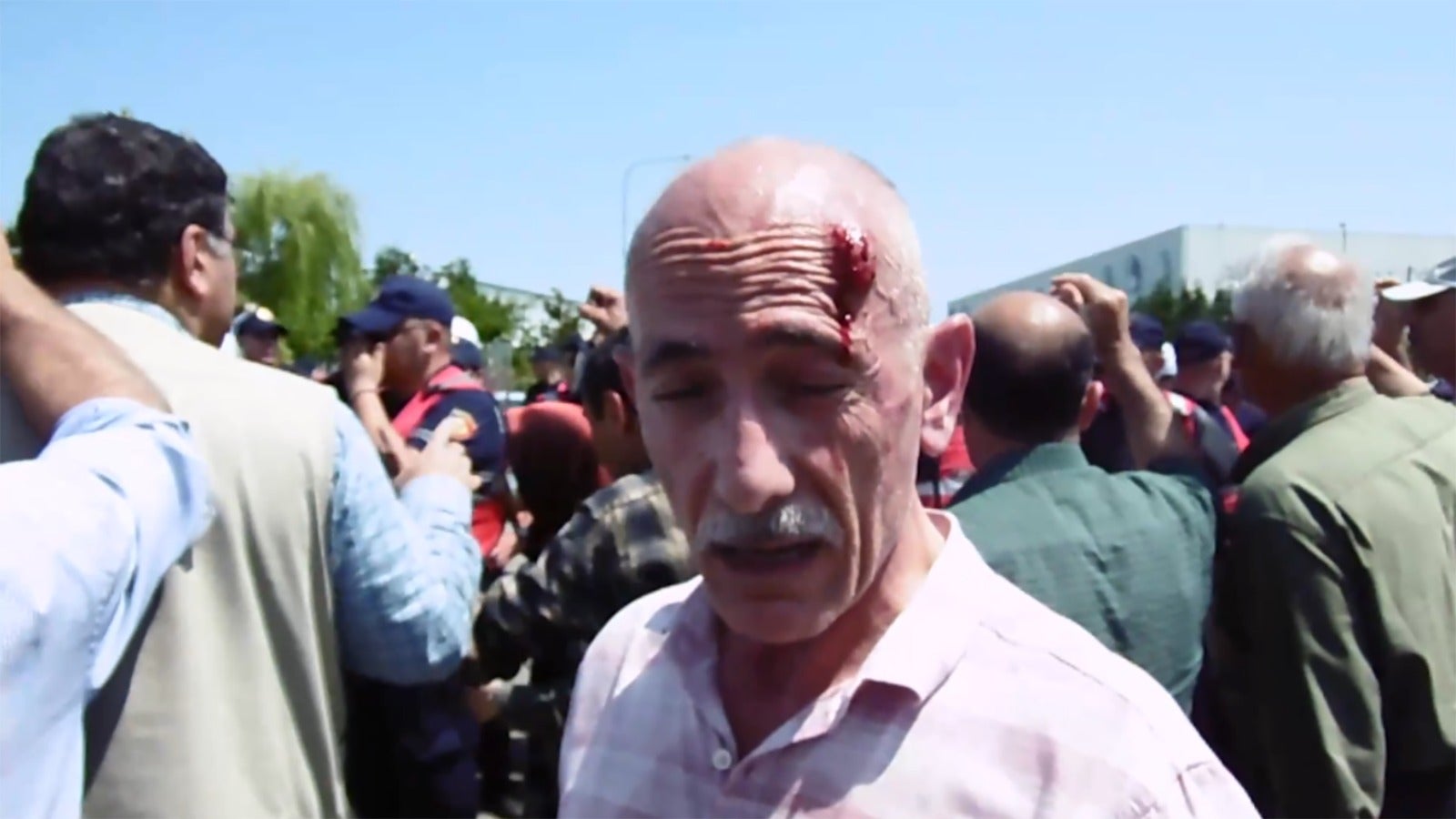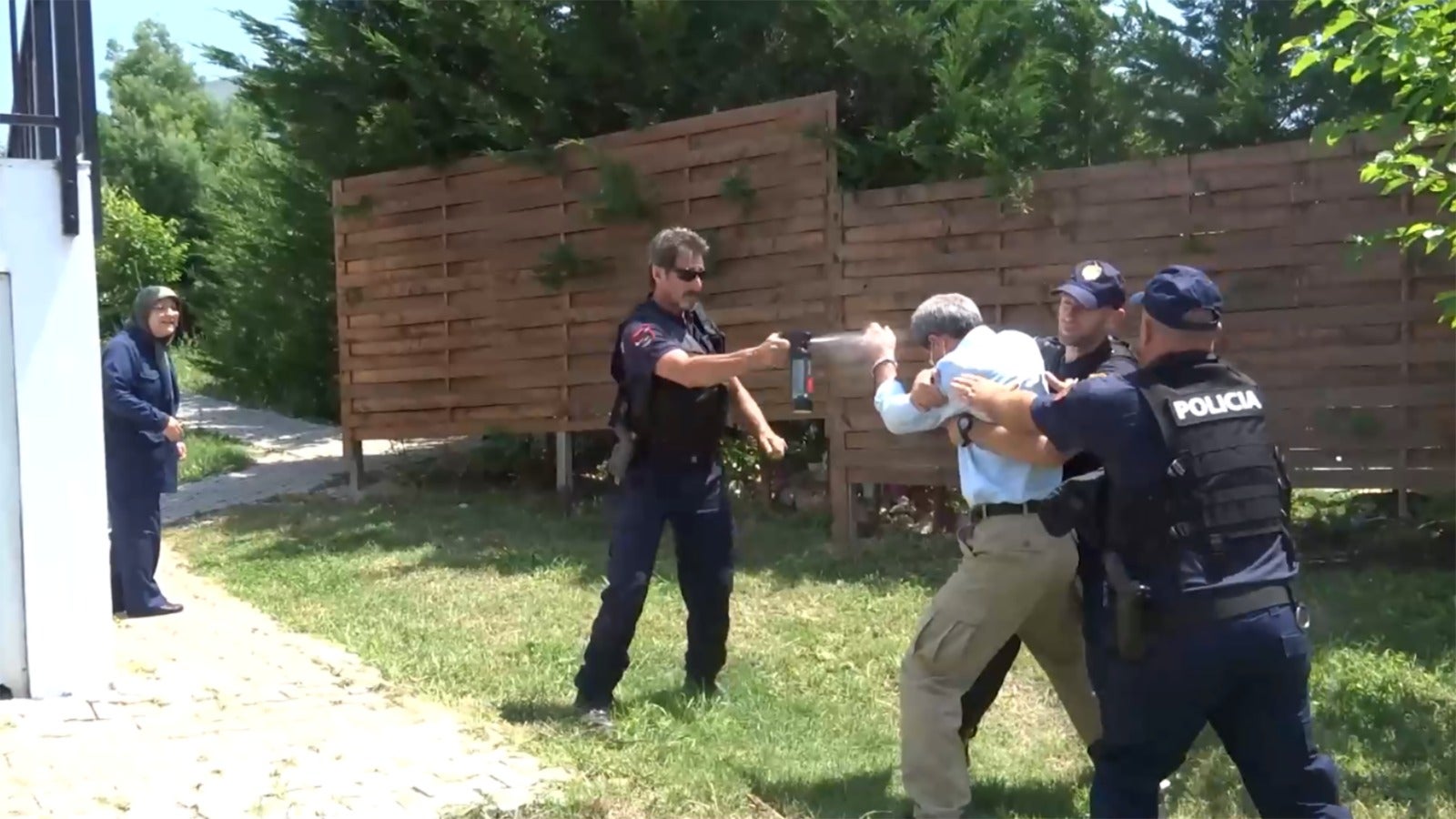
Opponents of Iran’s authoritarian government accused two European governments of doing the bidding of Tehran on Tuesday as their headquarters were raided in a violent police action and officials denied their bid to hold a rally in the streets of Paris.
The two separate developments for the MEK, a group of Iranians who have fought against the Ayatollah’s government for decades, occurred within hours of each other and drew serious questions about whether Tehran’s influence was once again being reasserted after months of protests embarassed the country’s government beginning last year.
In Albania, a shocking scene played out at Ashraf III, headquarters of the MEK, as hundreds of police officers stormed the closed-off compound where a private security team typically protects the civilian residents from the threat of terror attacks by Iranian agents.
Photos and videos obtained by The Independent showed chaos unfolding on the camp’s grounds, with elderly men and women facing off against lines of officers who drenched them with multiple streams of chemical spray.
Multiple injuries were seen in images obtained from the scene, including one where an older man is seen with a serious laceration on the front of his head. In other pictures, the body of a man identified as 65-year-old Ali Mostashari is carried from the site of the violence, with signs of a laceration or severe bruising visible squarely on the centre of his forehead.

Sources at the scene said that Mr Mostashari was killed by a police officer after being struck; police officials have denied this to local Albanian media services.
At the same time, the police claimed that their officers “did not use weapons under any circumstances,” a statement apparently contradicted by the evidence of lacerations as well as the images of multiple officers deploying chemical spray.
One image even depicts a man in a collared shirt with graying hair restrained by two officers wearing body armor as a third blasts him in the face with chemical spray.

Local media reports indicated that the raid was precipitated by an investigation into supposed cyber crimes; media reports and sources in the camp confirmed that multiple computers were taken by authorities during the raid. Separately, local police told Al Arabiya that they were probing a “violation of agreements and commitments” made by the MEK’s members “when they settled in Albania solely for humanitarian purposes”.
A source within the MEK questioned that explanation and said it was unclear what it meant.
Dozens were reportedly injured during the clashes between police and MEK members outside of the complex’s buildings.
Officials with the MEK’s political arm demanded that the US and United Nations, which organised the creation of group’s humanitarian refuge in Albania, denounce the raid and blamed Albanian authorities for carrying out the “murder” of Mr Mostashari, which as a senior MEK member they said had long been a goal of Tehran.

“The European Union, for whose membership Albania has applied, must condemn this barbaric attack and hold the Albanian government accountable,” the group continued.
In a brief statement, the US State Department offered no indication that it believed there was any connection between the police raid and lobbying by Iran’s government. The agency stated that Albania’s government had explained the raid to be the result of a court order, and appeared to take the Albanian government’s word on whether all laws were followed and the rights of those involved were upheld. The statement was strongly rebuked by NCRI members.
Ashraf III, first set up in 2014, has been the home for hundreds of MEK members following the end of their armed resistance against Iran’s government. The relocation of the movement, which remains vocally committed to the overthrow of Iran’s government, has not been without controversy and has led to threats of attacks as well as other criticism of the MEK itself from Iran’s government and others.
But the group also increasingly is enjoying support from prominent politicians in Washington and elsewhere. Their rallies and conventions in Paris and elsewhere are frequently attended by US foreign policy notables from both parties, including in the past by prominent US figures like Mike Pence, currently running for the 2024 nomination, and former Secretary of State Mike Pompeo.
Whether this year’s planned event will still happen is now unclear. Announcing that officials were tracking threats of a possible terrorist attack at the group’s outdoor rally, French authorities wrote to the MEK’s political arm, the NCRI, separately on Tuesday denying their request to host the event.
“Moreover, given the terrorist risk cannot be neglected, the holding of such an event would make its security but also the security of sensitive guests extremely complex,” read the letter provided by French authorities to the NCRI.
Some supporters of the Iranian opposition group quickly denounced the raid and the cancellation of the NCRI’and suggested that their connections were obvious.
“Deeply concerned that across Europe—and especially right now, France and Albania—our allies are appeasing the Iranian regime and cracking down on anti-regime dissidents. The Biden [administration] is reportedly supporting these pro-regime policies, while also directly boosting the regime by sending the Ayatollah hundreds of billions of dollars and pushing for the release of terrorists. The crackdowns and appeasement will embolden and enable the Iranian regime to commit more global terrorism. They pose a direct threat to the safety and security of Americans,” wrote Senator Ted Cruz.
“Paris bans an Iranian opposition meeting on the same day the Albanian police raid the Iranian opposition camp Ashraf 3. This is no coincidence but submission to the Iranian Mullahs. Unacceptable,” wrote Els Ampe, a member of Belgium’s Senate.
It was a move that the group denounced as French President Emmanuel Macron caving to pressure from an authoritarian regime.
“With Iran’s ruthless regime teetering on the edge, France has yet again rushed to the rescue,” read a scathing statement from Ali Safavi, a member of the NCRI’s foreign affairs council. “It...emboldens the medieval mullahs in their persistent use of blackmail and hostage-taking to manipulate concessions from their Western counterparts.”
Sources with the group vowed that their plans to hold indoor events in France would go forward, regardless of the threat of terror attacks or potential pushback from French authorities.







